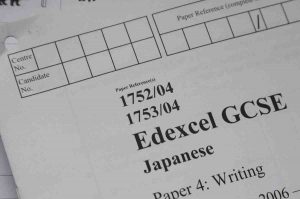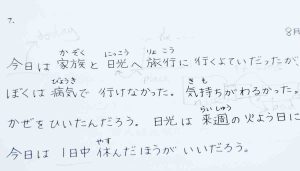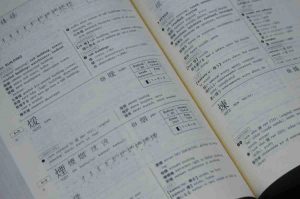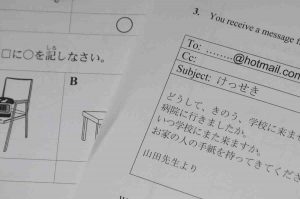GCSE (Edexcel)
Who can be a candidate?
Candidates who will find this easiest are people aged between 14 and 18.

When does the exam take place?
Late May/early June.
How much should candidates study before the exam?
A good candidate should study at least four hours a week for one year.
Is it difficult to pass?
No.
It should not be difficult as long as candidates study with a good teacher and are motivated.
What skills dose the exam require?
The exam tests the following skills:
The ability to:
- read and write Hiragana, Katakana, about 200 kanji
- read and understand short statements and essays (300 letters)
- listen to a dialogue between friends/parents and children
- take notes
- to write short essays (about 160 – 300 letters)
What do you have to know to pass this exam?
Writing
- hiragana,
- katakana

- about 200 kanji
Vocabulary
- 1000 words minimum
What kind of vocabulary is needed?
The vocabulary needed is broadly related to school life and life for young people.
Therefore, for example, the names of the main school subjects are essential.
There is a vocabulary list as follows:
Are candidates allowed to use a dictionary?
No.
The use of any kind of dictionary is not allowed in the exam.
How is the exam organized?
There are three papers.
(Paper 2 is an Oral paper, which is optional. )
Paper 1 – Listening and Responding (45 minutes)
You will hear the recorded questions twice. The tape speed is slow enough for beginners to understand. Each word/phrase/sentence is carefully pronounced, so candidates who have practised listening prior to the exam should not find the speed too quick.
There are fifty questions in all. One third of the questions are very basic so most candidates should find these easy. Halfway through candidates will listen to a dialogue from which they have to number eight pictures in the order of occurrence.
Other listening questions require students to focus on several points in a dialogue to obtain specific pieces of information. For example, in the 2006 exam, students had to extract information on how many family members will stay in a hotel, when they check in/out, how much staying in a hotel will cost them, etc.
Paper 2 – Oral (8 – 12 minutes)
Below is how the GCSE Japanese oral examination is conducted:
There are five topic areas three of which are chosen by Edexel as core topics to be tested on the exam day.
Which three topics chosen out of the five differs each year.
The five topic areas are:
- In the United Kingdom and abroad
- Education, training and employment
- House, home and daily routine
- Media, entertainment and youth culture
- Social activities, fitness and health
Prior to the actual oral exam students are given the list of topic- related questions from which the candidates choose one. They have several minutes in which they are allowed to write out some notes on the chosen topic on A4 size paper.
With these notes, the candidate’s oral communication abilities are tested by conversing first on the chosen topic for up to four minutes with the native examiner.
Then, the examiner moves on to the second topic of which order is specified by Edexcel. The question paper carries model questions on related topics, but the examiner can create their own questions as long as they broadly fall into this topic category.
This second topic can be discussed for up to four minutes, after which the examiner will move on to the third (final) topic.
So the actual oral exam lasts up to 12 minutes during which time students are supposed to converse with the examiner interactively rather than just to speak in a monologue.
All of these conversations are recorded and marked by Edexcel.
Students are encouraged to show off a wide range of vocabulary and grammatical constructions in polite forms and to speak with as high a degree of accuracy as possible.
Paper 3 – Reading and Responding (55 minutes)
The first couple of questions test if students can read hiragana/katakana/kanji words. This should not be difficult as long as candidates have studied hard.
The last three questions are reading comprehension, but this should not be problematic as one of these requires students to fill in the right vocabulary from the list given. The answers should be clear from the context.
The second one is true/false questions. Students read a simple essay/letter and judge if each statement is true against the information provided in this essay.
In the last questions students read some notes/notice and answer the questions in English.
Paper 4 – Writing
There are usually four questions, two of which are rather basic as they require candidates to take notes rather than to write sentences.
In question 3, after reading a short passage (about 100 letters), students are asked several questions both in Japanese and in English.
The last question is the most difficult as this requires students to write about 160-300 -letter essay.
Students have to choose one of the two topics given.
Each topic has a couple of short questions the answers to which have to be included in the essay. For example, in the 2004 exam, the two topics were:
- You stayed at home with your younger brother yesterday because there was no school.
What did you do?
Why? - My favorite town.
Why do you like it best?
What would you do in this town?
Strategies to pass:
- There is no textbook/course book for Japanese GCSE so it is important to choose good textbooks. Some good books are recommended on my website.
Click here to see them. - Learn hiragana and katakana as quickly as possible
Try to learn the 46 hiragana letters in the first month, then the 46 katakana letters in the second month.
Never study Japanese in romaji, as this will form a bad habit. - Once you are confident reading both hiragana and katakana, use a core textbook to learn the grammatical functions, kanji and vocabulary in context.
In addition, start listening and speaking practice based on what you have learned. - Study reading comprehension in each lesson.
- Make vocabulary/kanji cards so that you can learn these words/characters while you are on the bus, for example.
- Practise taking notes in hiragana/katakana for things you need for a day out, for example.
- Practise writing essays and, reading comprehensions with your teacher as well as listening to formal Japanese.

